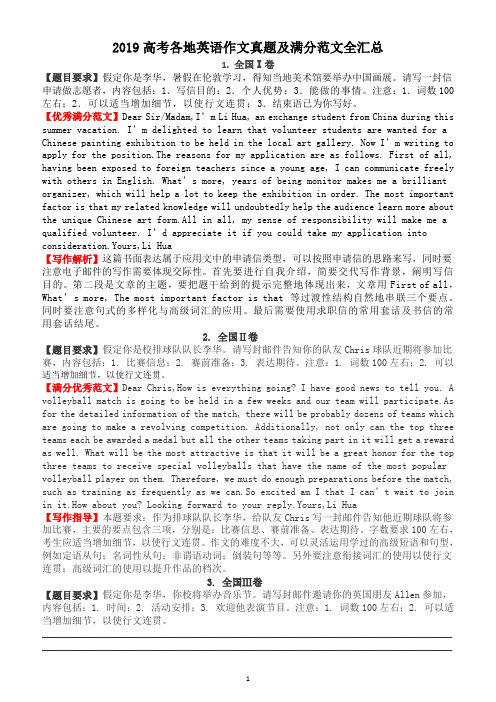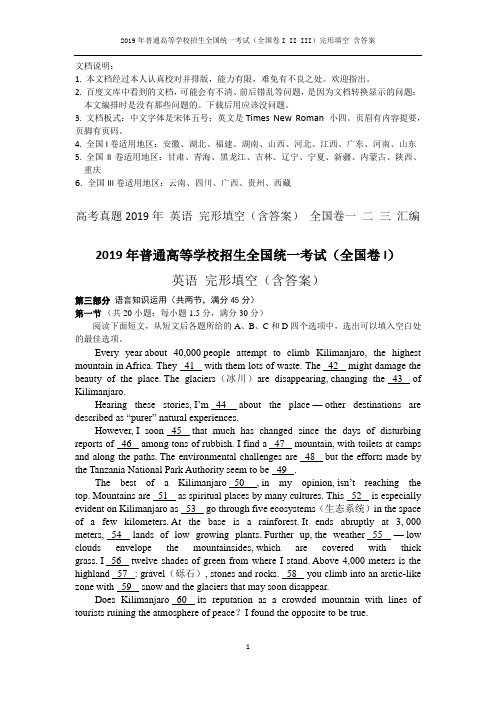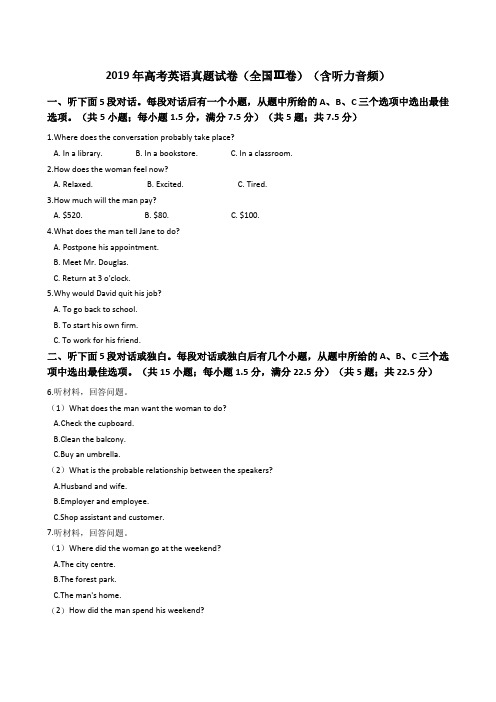2019年各省高考英语真题汇总
【解析版】2019年全国高考山东卷英语试题及答案

2019年普通高等学校招生全国统一考试(山东卷)英语注意事项:1.答卷前,考生务必将自己的姓名、准考证号填写在答题卡上。
2.回答选择题时,选出每小题答案后,用铅笔把答题卡上对应题目的答案标号涂黑。
如需改动,用橡皮擦干净后,再选涂其他答案标号。
回答非选择题时,将答案写在答题卡上,写在本试卷上无效。
3.考试结束后,将本试卷和答题卡一并交回。
第一部分听力(共两节,满分30分)做题时,先将答案标在试卷上。
录音内容结束后,你将有两分钟的时间将试卷上的答案转涂到答题卡上。
第一节 (共5小题;每小题1.5分,满分7.5分)听下面5段对话。
每段对话后有一个小题,从题中所给的A、B、C三个选项中选出最佳选项。
听完每段对话后,你都有10秒钟的时间来回答有关小题和阅读下一小题。
每段对话仅读一遍。
例:How much is the shirt?A. £19.15.B. £9.18.C. £9.15.答案是C。
1.Where does this conversation take place?A. In a classroom.B. In a hospital.C. In a museum. 【答案】B【解析】【详解】此为听力题,解析略。
2.What does Jack want to do?A. Take fitness classes.B. Buy a pair of gym shoes.C. Change his work schedule.【答案】A【解析】【详解】此为听力题,解析略。
3.What are the speakers talking about?A. What to drink.B. Where to meet.C. When to leave. 【答案】B【解析】【详解】此为听力题,解析略。
4.What is the relationship between the speakers?A. Colleges.B. Classmates.C. Strangers.【答案】C【解析】【详解】此为听力题,解析略。
高考英语2019 全国卷真题 (3套)

)":0>30>2O>34M2-+3045;4/1;4; 3+;+
!*":0F>54F+.<GH15;2;5>,< 3+3045+>; 2.5E>/4
'&P43.5< 3+2/0++A& (&)0><G4045Q+H&
'&B3M2,>5-&
(&B3M2H5+,<&
)&P43154E5+- ,+5?&
'&L$$ -1<.342&
(&"#$ -1<.342&
'&"$ F4>52&
(&"L F4>52&
)&"# F4>52&
)&U# -1<.342&
("*+,;+42304,+->< E44A>H+.3C>-42M213.>31+< '&J-H>55>224;&
听第
#"
段材料回答第
或独白前你将有时间阅读各个小题每小题 # 秒钟听完后各!(" *+, -./0 31-4 ,1AA304 ->< @5+H>HAF 2@4<; 4K45/121<G
2019高考各地英语作文真题及满分范文全汇总

2019高考各地英语作文真题及满分范文全汇总1. 全国Ⅰ卷【题目要求】假定你是李华,暑假在伦敦学习,得知当地美术馆要举办中国画展。
请写一封信申请做志愿者,内容包括:1.写信目的:2.个人优势:3.能做的事情。
注意:1.词数100左右;2.可以适当增加细节,以使行文连贯;3.结束语已为你写好。
【优秀满分范文】Dear Sir/Madam,I’m Li Hua, an exchange student from China during this summer vacation. I’m delighted to learn that volunteer students are wanted for a Chinese painting exhibition to be held in the local art gallery. Now I’m writing to apply for the position.The reasons for my application are as follows. First of all, having been exposed to foreign teachers since a young age, I can communicate freely with others in English. What’s more, years of being monitor makes me a brilliant organizer, which will help a lot to keep the exhibition in order. The most important factor is that my related knowledge will undoubtedly help the audience learn more about the unique Chinese art form.All in all, my sense of responsibility will make me a qualified volunteer. I’d appreciate it if you could take my application into consideration.Yours,Li Hua【写作解析】这篇书面表达属于应用文中的申请信类型,可以按照申请信的思路来写,同时要注意电子邮件的写作需要体现交际性。
2019年英语高考真题全国1卷试题+答案(可编辑修改word版)

2019 年普通高等学校招生全国统一考试英语2.回答选择题时,选出每小题答案后,用铅笔把答题卡上对应题目的答案标号涂黑。
如需改动,用橡皮擦干净后,再选涂其他答案标号。
回答非选择题时,将答案写在答题卡上,写在本试卷上无效。
3.考试结束后,将本试卷和答题卡一并交回。
第一部分听力(共两节,满分30 分)做题时,先将答案标在试卷上。
录音内容结束后,你将有两分钟的时间将试卷上的答案转涂到答题卡上。
第一节(共5 小题;每小题 1.5 分,满分7.5 分)听下面5 段对话。
每段对话后有一个小题,从题中所给的A、B、C 三个选项中选出最佳选项。
听完每段对话后,你都有10 秒钟的时间来回答有关小题和阅读下一小题。
每段对话仅读一遍。
1.Where does this conversation take place?A.In a classroom.B. In a hospital.C. In a museum.2.What does Jack want to do?A.Take fitness classes.B. Buy a pair of gym shoes.C. Change his work schedule.3.What are the speakers talking about?A.What to drink.B. Where to meet.C. When to leave.4.What is the relationship between the speakers?A.Colleagues.B. Classmates.C. Strangers.5.Why is Emily mentioned in the conversation?A.She might want a ticket.B. She is looking for the man.C. She has an extra ticket.第二节(共15 小题;每小题1.5 分,满分22.5 分)听下面5 段对话或独白。
2019年全国I卷+II卷+III卷高考英语真题及答案

2019 普通高等学校招生全国统一考试(新课标I)英语(考试时间:120分钟试卷满分:150分)注意事项:1. 答卷前,考生务必将自己的姓名、准考证号填写在答题卡上。
2. 回答选择题时,选出每小题答案后,用铅笔把答题卡上对应题目的答案标号涂黑。
如需改动,用橡皮擦干净后,再选涂其他答案标号。
回答非选择题时,将答案写在答题卡上,写在本试卷上无效。
3. 考试结束后,将本试卷和答题卡一并交回。
第Ⅰ卷第一部分听力(共两节,满分30分)做题时,先将答案标在试卷上。
录音内容结束后,你将有两分钟的时间将试卷上的答案转涂到答题卡上。
第一节(共5小题;每小题1。
5分,满分7.5分)听下面5段对话。
每段对话后有一个小题,从题中所给的A、B、C三个选项中选出最佳选项。
听完每段对话后,你都有10秒钟的时间来回答有关小题和阅读下一小题。
每段对话仅读一遍.例:How much is the shirt?A.£19。
15.B. £9.18.C. £9。
15。
答案是C.1.Where does this conversation take place?A. In a classroom。
B. In a hospital。
C。
In a museum。
2。
What does Jack want to do?A。
Take fitness classes。
B。
Buy a pair of gym shoes.C。
Change his work schedule.3。
What are the speakers talking about?A. What to drink。
B。
Where to meet. C. When to leave。
4.What is the relationship between the speakers?A. Colleges.B。
Classmates.C。
Strangers。
5.Why is Emily mentioned in the conversation?A. She might want a ticket。
高考真题 2019全国卷(1,2,3汇编)英语卷 完型填空(含答案)

文档说明:1. 本文档经过本人认真校对并排版,能力有限,难免有不良之处。
欢迎指出。
2. 百度文库中看到的文档,可能会有不清、前后错乱等问题,是因为文档转换显示的问题;本文编排时是没有那些问题的。
下载后用应该没问题。
3. 文档板式:中文字体是宋体五号;英文是Times New Roman 小四。
页眉有内容提要,页脚有页码。
4. 全国I卷适用地区:安徽、湖北、福建、湖南、山西、河北、江西、广东、河南、山东5. 全国II卷适用地区:甘肃、青海、黑龙江、吉林、辽宁、宁夏、新疆、内蒙古、陕西、重庆6. 全国III卷适用地区:云南、四川、广西、贵州、西藏高考真题2019年英语完形填空(含答案)全国卷一二三汇编2019年普通高等学校招生全国统一考试(全国卷I)英语完形填空(含答案)第三部分语言知识运用(共两节,满分45分)第一节(共20小题;每小题1.5分,满分30分)阅读下面短文,从短文后各题所给的A、B、C和D四个选项中,选出可以填入空白处的最佳选项。
Every year about 40,000 people attempt to climb Kilimanjaro, the highest mountain in Africa. They 41 with them lots of waste. The 42 might damage the beauty of the place. The glaciers(冰川)are disappearing, changing the 43 of Kilimanjaro.Hearing these stories, I’m 44 about the place — other destinations are described as “purer” natural experiences.However, I soon 45 that much has changed since the days of disturbing reports of 46 among tons of rubbish. I find a 47 mountain, with toilets at camps and along the paths. The environmental challenges are 48 but the efforts made by the Tanzania National Park Authority seem to be 49 .The best of a Kilimanjaro 50 , in my opinion, isn’t reaching the top. Mountains are 51 as spiritual places by many cultures. This 52 is especially evident on Kilimanjaro as 53 go through five ecosystems(生态系统)in the space of a few kilometers. At the base is a rainforest. It ends abruptly at 3, 000 meters, 54 lands of low growing plants. Further up, the weather 55 — low clouds envelope the mountainsides, which are covered with thick grass. I 56 twelve shades of green from where I stand. Above 4,000 meters is the highland 57 : gravel(砾石), stones and rocks. 58 you climb into an arctic-like zone with 59 snow and the glaciers that may soon disappear.Does Kilimanjaro 60 its reputation as a crowded mountain with lines of tourists ruining the atmosphere of peace?I found the opposite to be true.41.A. keep B. mix C. connect D. bring42. A. stories B. buildings C. crowds D. reporters43. A. position B. age C. face D. name44. A. silent B. skeptical C. serious D. crazy45. A. discover B. argue C. decide D. advocate46. A. equipment B. grass C. camps D. stones47. A. remote B. quiet C. all D. clean48. A. new B. special C. significant D. necessary49. A. paying off B. spreading out C. blowing up D. fading away50. A. atmosphere B. experience C. experiment D. sight51. A. studied B. observed C. explored D. regarded52. A. view B. quality C. reason D. purpose53. A. scientists B. climbers C. locals D. officials54. A. holding on to B. going back to C. living up to D. giving way to55. A. changes B. clears C. improves D. permits56. A. match B. imagine C. count D. add57. A. village B. desert C. road D. lake58. A. Obviously B. Easily C. Consequently D. Finally59. A. permanent B. little C. fresh D. artificial60. A. enjoy B. deserve C. save D. acquire2019年普通高等学校招生全国统一考试(全国卷II)英语完形填空(含答案)第三部分语言知识运用(共两节,满分45分)第一节(共20小题;每小题1.5分,满分30分)阅读下面短文,从短文后各题所给的A、B、C和D四个选项中,选出可以填入空白处的最佳选项。
2019年高考英语真题汇总附带解析

2019年普通高等学校招生全国统一考试(全国卷Ⅰ) 第一部分听力(共两节,满分30分)第一节(共5小题;每小题1.5分,满分7.5分)听下面5段对话。
每段对话后有一个小题,从题中所给的A、B、C三个选项中选出最佳选项。
听完每段对话后,你都有10秒钟的时间来回答有关小题和阅读下一小题。
每段对话仅读一遍。
例:How much is the shirt?A.£19.15.B.£9.18.C.£9.15.答案是C。
1.Where does this conversation take place?A.In a classroom.B.In a hospital.C.In a museum.2.What does Jack want to do?A.Take fitness classes.B.Buy a pair of gym shoes.C.Change his work schedule.3.What are the speakers talking about?A.What to drink. B.Where to meet.C.When to leave.4.What is the relationship between the speakers?A.Colleagues. B.Classmates.C.Strangers.5.Why is Emily mentioned in the conversation?A.She might want a ticket.B.She is looking for the man.C.She has an extra ticket.第二节(共15小题;每小题1.5分,满分22.5分)听下面5段对话或独白。
每段对话或独白后有几个小题,从题中所给的A、B、C三个选项中选出最佳选项。
听每段对话或独白前,你将有时间阅读各个小题,每小题5秒钟;听完后,各小题将给出5秒钟的作答时间。
2019年高考英语真题试卷(全国Ⅲ卷)(word版+答案+解析)

2019年高考英语真题试卷(全国Ⅲ卷)(含听力音频)一、听下面5段对话。
每段对话后有一个小题,从题中所给的A、B、C三个选项中选出最佳选项。
(共5小题;每小题1.5分,满分7.5分)(共5题;共7.5分)1.Where does the conversation probably take place?A. In a library.B. In a bookstore.C. In a classroom.2.How does the woman feel now?A. Relaxed.B. Excited.C. Tired.3.How much will the man pay?A. $520.B. $80.C. $100.4.What does the man tell Jane to do?A. Postpone his appointment.B. Meet Mr. Douglas.C. Return at 3 o'clock.5.Why would David quit his job?A. To go back to school.B. To start his own firm.C. To work for his friend.二、听下面5段对话或独白。
每段对话或独白后有几个小题,从题中所给的A、B、C三个选项中选出最佳选项。
(共15小题;每小题1.5分,满分22.5分)(共5题;共22.5分)6.听材料,回答问题。
(1)What does the man want the woman to do?A.Check the cupboard.B.Clean the balcony.C.Buy an umbrella.(2)What is the probable relationship between the speakers?A.Husband and wife.B.Employer and employee.C.Shop assistant and customer.7.听材料,回答问题。
- 1、下载文档前请自行甄别文档内容的完整性,平台不提供额外的编辑、内容补充、找答案等附加服务。
- 2、"仅部分预览"的文档,不可在线预览部分如存在完整性等问题,可反馈申请退款(可完整预览的文档不适用该条件!)。
- 3、如文档侵犯您的权益,请联系客服反馈,我们会尽快为您处理(人工客服工作时间:9:00-18:30)。
各省高考英语真题汇总1.2018年高考英语1 (含答案)2.2018年全国卷II卷笔试试题+答案3.2018年全国卷III卷笔试试题+答案4.2018北京卷英语高考真题5.2018江苏卷英语高考真题6.2018天津卷英语高考真题7.2018浙江英语真题1.2018年高考英语1 (含答案)2018年普通高等学校招生全国统一考试英语第一部分听力(共两节,满分30分)做题时,先将答案标在试卷上。
录音内容结束后,你将有两分钟的时间将试卷上的答案转涂到答题卡上。
第一节(共5小题:每小题1.5分,满分7.5分)听下面5段对话。
每段对话后有一个小题,从题屮所给的A、B、C三个选项屮选出最佳选项。
听完每段对话后,你都有10秒钟的时间来回答有关小题和阅读下一小题。
每段对话仅谈一遍。
例:How much is the shirt?A.£19.15.B. £9.18.C. £9.15.答案是C。
1. What will James do tomorrow?A. Watch a TV program.B. Give a talk.C. Write a report.2. What can we say about the woman?A. She’s generous.B. She’s curious.C. She’s helpful.3. When does the train leave?A. At 6:30.B. At 8:30.C. At 10:30.4. How docs the woman go to work?A. By car.B. On foot.C. By bike.5. What is the probable relationship between the speakers?A. Classmates.B. Teacher and student.C. Doctor and patient.第二节(共15小题:每小题1.5分,满分22.5分)听下面5段对话或独內。
每段对话或独A后有几个小题,从题中所给的A、B、C 三个选项中选出最佳选项。
听每段对话或独白前,你将有时间阅读各个小题,每小题5 秒钟:听完后,各小题将给出5秒钟的作答时间。
每段对话或独白读两遍。
听第6段材料,回答第6、7题。
6. What does the woman regret?A. Giving up her research.B. Dropping out of college.C. Changing her major.7. What is the woman interested in studying now?A. Ecology.B. Education.C. Chemistry.听第7段材料,回答第8、9题。
8.What is the man?A.A hotel manager.B. A tour guide. 52C. A taxi driver.9.What is the man doing for the woman?A. Looking for some local foods.B. Showing her around the seaside.C. Offering information about a hotel.听第8段材料,冋答第10至12题。
10.Where docs the conversation probably take place?A. In an office.B. At home.C. At a restaurant.11. What will the speakers do tomorrow evening?A. Go to a concert.B. Visit a friend.C. Work extra hours.12. Who is Alice going to call?A.Mike.B. Joan.C. Catherine.听第9段材料,回答第13至16题。
13.Why does the woman meet the man?A. To look at an apartment.B. To deliver some furniture.C. To have a meal together.14. What does the woman like about the carpet?A. Its color.B. Its design.C.Its quality.15. What does the man say about the kitchen?A. It’s a good size.B. It’s newly painted.C.It’s adequately equipped.16. What will the woman probably do next?A.Go downtown.B. Talk with her friend.C.Make payment.听第10段材料,回答第丨7至20题。
17. Who is the speaker probably talking to?A. Movie fans.B. News reporters.C. College students.18. When did the speaker take English classes?A. Before he left his hometown.B. After he came to America.C. When he was 15 years old.19. How does the speaker feel about his teacher?A. He’s proud.B. He’s sympathetic.C. He’s grateful.20. What does the speaker mainly talk about?A. How education shaped his life.B. How his language skills improved.C. How he managed his business well.第二部分阅读理解(共两节,满分40分)第一节(共15小题:每小题2分,满分30分)阅淡下列短文,从每題所给的A、B、C和D叫个选项中,选出最佳选项。
AWashington, D.C. Bicycle ToursCherry Blossom Bike Tour in Washington, D.C.Duration: 3 hoursThis small group bike tour is a fantastic way to see the world-famous cherry trees with beautiful flowers of Washington, D.C. Your guide will provide a history lesson about the trees and the famous monuments where they blossom. Reserve your spot before availability - and the cherry blossoms - disappear!Washington Capital Monuments Bicycle TourDuration: 3 hours (4 miles)Join a guided bike tour and view some of the most popular monuments in Washington, D.C. Explore the monuments and memorials on the National Mall as your guide shares unique facts and history at each stop. Guided tour includes bike, helmet, cookies and bottled water.Capital City Bike Tour in Washington, D.C.Duration: 3 hoursMorning or Afternoon, this bike tour is the perfect tour for D.C. newcomers and locals looking to experience Washington, D.C. in a healthy way with minimum effort. Knowledgeable guides will entertain you with the most interesting stories about Presidents, Congress, memorials, and parks. Comfortable bikes and a smooth tour route (路线)make cycling between the sites fun and relaxing.Washington Capital Sites at Night Bicycle TourDuration: 3 hours (7 miles)Join a small group bike tour for an evening of exploration in the heart of Washington,D.C. Get up close to the monuments and memorials as you bike the sites of Capitol Hill and the National Mall. Frequent stops are made for photo taking as your guide offers unique facts and history. Tour includes bike, helmet, and bottled water. All riders are equipped with reflective vests and safety lights.21. Which tour do you need to book in advance?A. Cherry Blossom Bike Tour in Washington, D.C.B. Washington Capital Monuments Bicycle Tour.C. Capital City Bike Tour in Washington,D.C.D. Washington Capital Sites at Night Bicycle Tour.22. What will you do on the Capital City Bike Tour?A. Meet famous people.B. Go to a national park.C. Visit well-known museums.D. Enjoy interesting stories.23. Which of the following does the bicycle tour at night provide?A. City maps.B. Cameras.C. Meals.D. Safety lights.BGood Morning Britain's Susanna Reid is used to grilling guests on the sofa every morning, but she is cooking up a storm in her latest role - showing families how to prepare delicious and nutritious meals on a tight budget.In Save Money: Good Food, she visits a different home each week and with the help of chef Matt Tcbbutt offers top tips on how to reduce food waste,while preparing recipes for under £5 per family a day. And the Good Morning Britain presenter says she’s been able to put a lot of what she's learnt into practice in her own home, preparing meals for sons, Sam, 14, Finn, 13, and Jack, 11.“We love Mexican churros, so I buy them on my phone from my local Mexican takeaway restaurant.” she explains. “I pay £5 for a portion (―份),but Matt makes them for 26p a portion, because they are flour, water, sugar and oil. Everybody can buy takeaway food, but sometimes we’re not aware how cheaply we can make this food ourselves.”The eight-part series (系列节目) Save Money: Good Food, follows in the footsteps of ITV's Save Money: Good Health, which gave viewers advice on how to get value from the vast range of health products on the market.With food our biggest weekly household expense, Susanna and Matt spend time with a different family each week. In tonight’s Easter special they come to the aid of a family in need o f some delicious inspiration on a budget. The team transforms the family’s long weekend of celebration with less expensive but still tasty recipes.24. What do we know about Susanna Reid?A. She enjoys embarrassing her guests.B. She has started a new programme.C. She dislikes working early in the morning.D. She has had a tight budget for her family.25. How does Matt Tebbutt help Susanna?A. He buys cooking materials for her.B. He prepares food for her kids.C. He assists her in cooking matters.D. He invites guest families for her.26. What does the author intend to do in paragraph 4?A. Summarize the previous paragraphs.B. Provide some advice for the readers.C. Add some background information.D. Introduce a new topic for discussion.27. What can be a suitable title for the text?A.Keeping Fit by Eating SmartB. Balancing Our Daily DietC.Making Yourself a Perfect ChefD. Cooking Well for LessCLanguages have been coming and going for thousands of years, but in recent times there has been less coming and a lot more going. When the world was still populated by Hunter-gatherers, small, tightly knit (联系) groups developed their own patterns of speech independent of each other. Some language experts believe that 10,000 years ago, when the world had just five to ten million people, they spoke perhaps 12,000 languages between them.Soon afterwards, many of those people started settling down to become farmers, and their languages too became more settled and fewer in number. In recent centuries, trade, industrialisation, the development of the nation-state and the spread of universal compulsory education, especially globalisation and better communications in the past few decades, all have caused many languages to disappear, and dominant languages such as English, Spanish and Chinese arc increasingly taking over.At present, the world has about 6,800 languages. The distribution of these languages is hugely uneven. The general rule is that mild zones have relatively few languages, often spoken by many people, while hot, wet zones have lots, often spoken by small numbers. Europe has only around 200 languages; the Americas about 1.000; Africa 2,400; and Asia and the Pacific perhaps 3,200, of which Papua New Guinea alone accounts for well over 800. The median number (中位数)of speakers is a mere 6,000, which means that half the world’s languages are spoken by fewer people than that.Already well over 400 of the total of 6,800 languages are close to extinction (消亡),with only a few elderly speakers left. Pick, at random, Busuu in Cameroon (eight remaining speakers),Chiapaneco in Mexico (150), Lipan Apache in the United States (two or three) or Wadjigu in Australia (one, with a question-mark): none of these seems to have much chance of survival.28. What can we infer about languages in hunter-gatherer times?A. They developed very fast.B. They were large in number.C. They had similar patterns.D. They were closely connected.29. Which of the following best explains “dominant” underlined in paragraph 2?A. Complex.B. Advanced.C. Powerful.D. Modem.30. How many languages are spoken by less than 6,000 people at present?A.About 6,800.B. About 3,400.C. About 2,400.D. About 1,200.31. What is the main idea of the text?A. New languages will be created.B. People’s lifestyles are reflected in languages.C. Human development results in fewer languages.D. Geography determines language evolution.DWe may think we’re a culture that gets rid of our worn technology at the first sight of something shiny and new, but a new study shows that we keep using our old devices (装置)well after they go out of style. That’s bad news for the environment - and our wallets - as these outdated devices consume much more energy than the newer ones that do the same things.To figure out how much power these devices are using, Callie Babbitt and her colleagues at the Rochester Institute of Technology in New York tracked the environmental costs for each product throughout its life - from when its minerals are mined to when we stop using the device. This method provided a readout for how home energy use has evolved since the early 1990s. Devices were grouped by generation. Desktop computers, basic mobile phones, and box-set TVs defined 1992. Digital cameras arrived on the scene in 1997. And MP3 players, smart phones, and LCD TVs entered homes in 2002, before tablets and e-readers showed up in 2007.As we accumulated more devices, however, we didn't throw out our old ones. “The living-room television is replaced and gets plante d in the kids’ room, and suddenly one day, you have a TV in every room of the house,” said one researcher. The average number of electronic devices rose from four per household in 1992 to 13 in 2007. We’re not just keeping these old devices - we continue t o use them. According to the analysis of Babbitt’s team, old desktop monitors and box TVs with cathode ray tubes are the worst devices with their energy consumption and contribution to greenhouse gas emissions (排放)more than doubling during the 1992 to 2007 window.So what’s the solution (解决方案)? The team’s data only went up to 2007, but the researchers also explored what would happen if consumers replaced old products with new electronics that serve more than one function, such as a tablet for word processing and TV viewing. They found that more on-demand entertainment viewing on tablets instead of TVs and desktop computers could cut energy consumption by 44%.32. What does the author think of new devices?A.They are environment-friendly.B. They are no better than the old.C.They cost more to use at home.D. They go out of style quickly.33. Why did Babbitt’s team conduct the research?A. To reduce the cost of minerals.B. To test the life cycle of a product.C. To update consumers on new technology.D.To find out electricity consumption of the devices.34. Which of the following uses the least energy?A.The box-set TV.B. The tablet.C.The LCD TV.D. The desktop computer.35. What does the text suggest people do about old electronic devices?A.Stop using them.B. Take them apart.C.Upgrade them.D. Recycle them.第二节(共5小题;每小题2分,满分10分)根据短文内容,从短文后的选项中选出能填入空白处的最佳选项。
